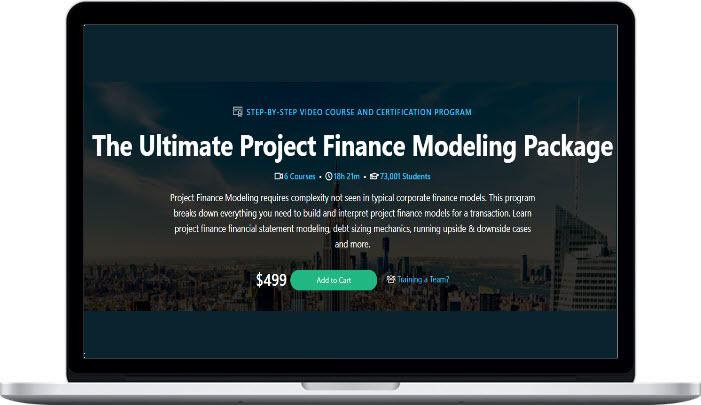Wall Street Prep – The Ultimate Project Finance Modeling Package
$499.00 $150.00
»Instant Delivery
Description
Wall Street Prep – The Ultimate Project Finance Modeling Package

Project Finance Modeling requires complexity not seen in typical corporate finance models. This program breaks down everything you need to build and interpret project finance models for a transaction. Learn project finance financial statement modeling, debt sizing mechanics, running upside & downside cases and more.
Learn to Build a Real-World Project Finance Model Step-By-Step
- Complete Project Finance Modeling Training
This course builds up each layer step by step, from how deals are put together to building best practice financial models through advanced analysis using macro powered data tables & scenario managers.
- Real World Case Study
Learn by doing – go through a case study to walk through building and optimizing a model from scratch.
- Used Widely at Investment Banks, Developers and Funds
This is the same comprehensive training program delivered to some of the world’s leading banks, developers and funds.
What You’ll Learn In The Ultimate Project Finance Modeling Package?
- Project finance theory and implementation
- Best-practice financial modeling
- How to build a project finance model from scratch
- Advanced debt & equity modeling: debt service reserve accounts, refinancing, shareholder loans
- Modeling depreciation, tax, working capital, and financial statements
- How to extend the financial model to different types of infrastructure, incorporate other sophisticated deal terms and multiple phases with different periodicity
What’s Included:
Boot Module and Case Study
- Section 1 of our Project Finance Modeling Program. Learn project finance through the lens of an airport. Review the theory of PF, discuss the business case of Heathrow Airport expansion, then dive into the particulars of the project finance model. Go through the case study step by step. Calculate CFADS, tax, debt ratios like DSCR & LLCR, and equity and project returns. Get hands on in the model. Run different cases to optimize the project and meet stakeholders criteria.
Excel DNA for Modelers
- Section 2 of our Project Finance Modeling Package. Learn the DNA of Excel and become a bulletproof financial modeler. Here, we break down the skillset of financial modeling and piece it together step by step with financial modeling best practices layered throughout. You’ll learn how formula works and when they break down and the top 50 shortcuts to make you a speed demon. By the end of this course, you’ll get up to 3x quicker at developing robust, transparent financial models.
Depreciation, Tax & Financial Statements
- Section 5 of out Project Finance Modeling Program. This section advances the accounting rigor around a project finance model. Like the other sections, each module begins with the “Why”, giving you the theoretical background, before diving into the “How” – the implementation in the model. Continuing from the Blueprint model, pull together the elements to deliver a bankable financial model. Calculate working capital using multiple methodologies, discuss and calculate corporate tax, calculate depreciation using straight line, reducing balance or MACRS methodology, bring together a P&L and Balance sheet. Improve the model robustness by adding checks.
Blueprint of the Model
- Section 3 of our Project Finance Modeling Program. With a wind-farm case study, this course guides you in building – from scratch – your very own infrastructure model. Model a greenfield asset, calculate revenue, fixed & variable expenses. Review the relevant parts of a term sheet and model paying down debt with annuity & sculpted repayment mechanisms, and analyze lender covenants. Bring the model together into a Cashflow Waterfall. Using equity & project returns, DSCR and other outputs, trace the drivers of performance with a scenario manager, and run a debt and equity type process as a window to how stakeholders might view the deal.
Advanced Debt & Equity
- Section 4 of our Project Finance Modeling Program. This section will challenge you to get the most out of a project finance deal. Using advanced material, it expands on our work in Blueprint and asks questions such as: How does DSCR target or gearing driven debt sizing work? How do I re-profile debt to optimize equity returns? How does a model integrate advanced funding features like a DSRA? Go further by adding in sophisticated funding structures, like the option to refinance debt and shareholder loans. Automate debt sizing and the scenario manager to solve the debt case, or run a debt process by evaluating multiple lender terms.
Bringing It All Together & Model Extensions
- Section 6 of our Project Finance Modeling Program. This section brings together everything we’ve learned so far and delivers a complete project finance model. We start to look into ways of extending the model with material such as how to change the construction timeframe from quarterly to monthly periodicity in a best practice manner, while keeping operations quarterly.
More courses from the same author: Wall Street Prep
Delivery Policy
When will I receive my course?
You will receive a link to download your course immediately or within 1 to 21 days. It depends on the product you buy, so please read the short description of the product carefully before making a purchase.
How is my course delivered?
We share courses through Google Drive, so once your order is complete, you'll receive an invitation to view the course in your email.
To avoid any delay in delivery, please provide a Google mail and enter your email address correctly in the Checkout Page.
In case you submit a wrong email address, please contact us to resend the course to the correct email.
How do I check status of my order?
Please log in to TradingAZ account then go to Order Page. You will find all your orders includes number, date, status and total price.
If the status is Processing: Your course is being uploaded. Please be patient and wait for us to complete your order. If your order has multiple courses and one of them has not been updated with the download link, the status of the order is also Processing.
If the status is Completed: Your course is ready for immediate download. Click "VIEW" to view details and download the course.
Where can I find my course?
Once your order is complete, a link to download the course will automatically be sent to your email.
You can also get the download link by logging into your TradingAZ account then going to Downloads Page.









